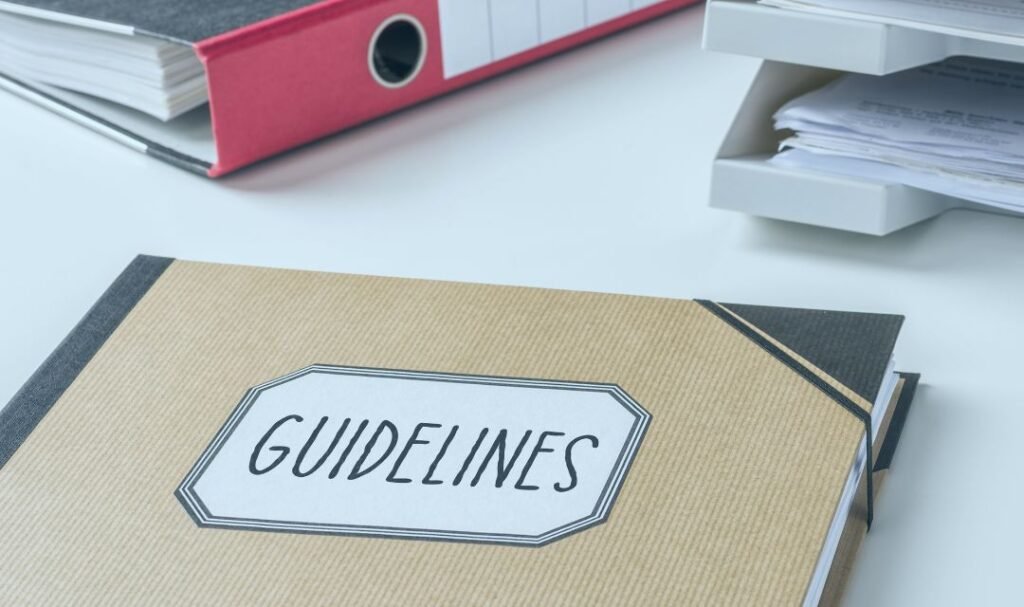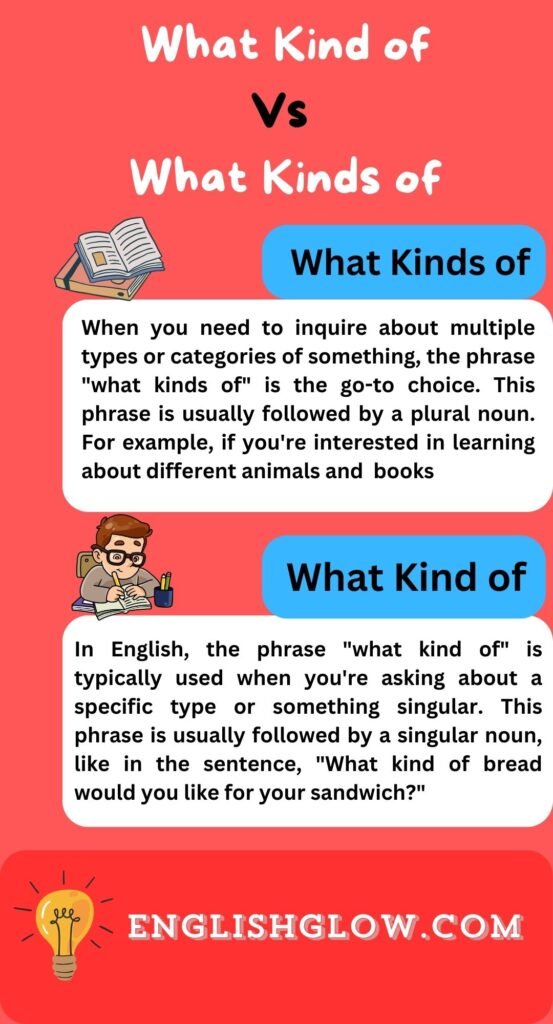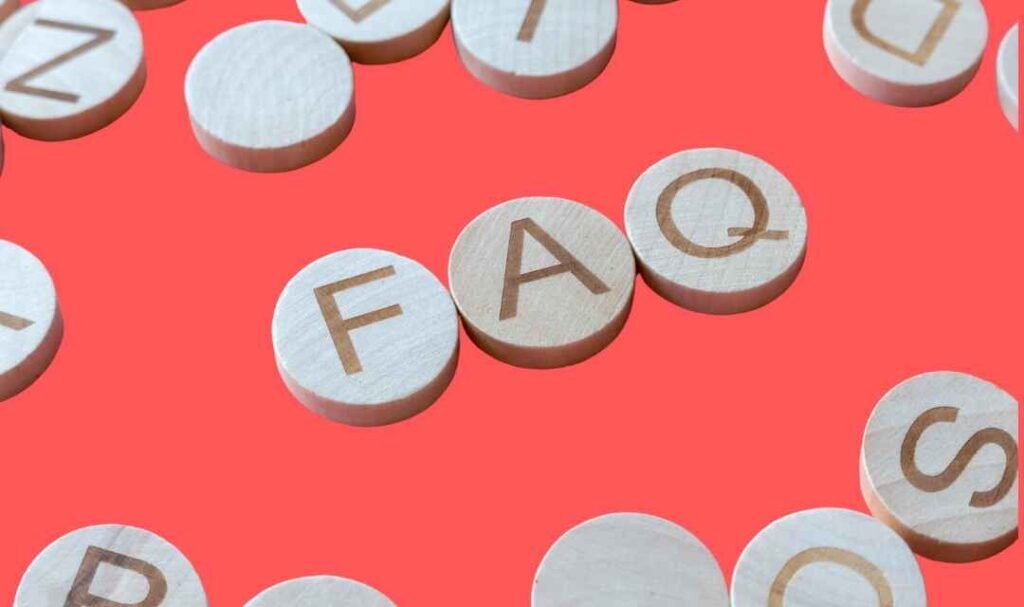When learning English, choosing the right words makes your communication clear and helps you connect with others. One common question learners often have is about the difference between ‘what kind of’ and ‘what kinds of’. These English phrases might look almost the same, but they have a subtle difference that affects your meaning.
Think of it like this: Imagine you’re in a cozy bakery. The smell of fresh bread is wonderful! Someone asks you, ‘What kind of bread do you want for your sandwich?’ Here, they’re asking you to pick one specific type – maybe wheat, white, or oatmeal. It’s about choosing just one thing.
Now, picture a busy farmer’s market. A vendor says excitedly, ‘We have all kinds of bread here: white, wheat, oatmeal, gluten-free – everything!’ Using ‘kinds of’ shows there are many different types available. It invites you to think about variety.
Understanding this singular vs plural distinction isn’t just about grammar rules; it’s about effective communication in everyday situations. From my own experience, I’ve found that pausing to ask myself – ‘Am I talking about one thing or several things?’ – really helps me speak more clearly. It’s a small but powerful way to make sure your words help share your thoughts effectively and kindly!”
What Kinds of
When you want to ask about different types or categories of things in English, the phrase “What kinds of…” is incredibly useful! It’s a natural way to show you’re curious about variety, not just one single answer. This common English phrase is always followed by a plural noun. Think about being in a classroom or talking to a friend: you might ask, “What kinds of music do you like?” or “What kinds of food are popular in your country?” Using this phrase signals you want a list or several examples, making your questions more engaging and opening up the conversation. It helps you practice English by learning new vocabulary related to groups – like different kinds of hobbies, animals, or jobs. For instance, asking “What kinds of exercises do you do?” gives much richer answers than just “Do you exercise?” Remember, using “What kinds of…” makes your everyday English conversations more detailed and interesting. It’s a simple tool to explore language learning and discover the wonderful diversity around us!
What Kind of
When learning English questions, the phrase “what kind of” is a common phrase that helps you ask for specific information. Think of it like a friendly guide that helps you narrow down choices. For example, imagine you’re ordering at a café, and the server asks, “What kind of bread would you like?”
This question isn’t just about bread – it helps language learners focus on one detail. Maybe you want whole wheat (healthy and nutty), white (soft and light), or oatmeal (hearty and filling). By using “what kind of“, the server helps you pick one option clearly. It’s a super helpful way to make everyday English conversations clearer and more natural!
Contextual Understanding
Understanding context is like having a superpower for English! It helps you unlock the true meaning behind words and questions. Imagine you’re sitting in a restaurant looking at a menu. If someone asks, “What kinds of soups are offered today?”, the context (the restaurant, the menu) tells you they aren’t asking for one soup. They want to know about the different soup options available. It’s a natural way to ask about variety when choices matter.
Research shows that in careful writing, like in trusted publications (The New Yorker, The Guardian), people strongly prefer “what kinds of” when asking about multiple types of things (like soups, desserts, or movies). Using the plural form (kinds) matches the plural noun (soups) when variety is expected. It’s a helpful language pattern.
Here’s the interesting part about everyday English: In casual speaking, people often relax the rules! You might hear someone say, “What kind of salad dressings do you have?” even though they clearly want a list. This shows how real conversation is flexible and focuses on the meaning and intent more than strict grammar sometimes.
For your own writing and clearer speaking, it’s usually best to match the form: use “kind of” for a single type and “kinds of” when talking about various options. Think of it like choosing the right tool – it makes your English communication smoother and easier for others to understand! Keep noticing these context clues; they make learning English expressions much more natural.
Practical Usage of What Kind of vs What Kinds of”
You know those super common phrases like “all kinds of wrong” or “all kinds of crazy”? They’re everyday phrases in American English, especially in casual conversations. These expressions are catchy and vivid – they really make language stronger! They emphasize a big amount or high intensity of something. For example, saying “That’s all kinds of wrong” doesn’t just mean “wrong.” It means very, very wrong. Similarly, “all kinds of crazy” means really, truly crazy. You’ll hear them in daily conversation, in movies, or on online video platforms showing real-life examples.
Here’s an interesting grammar point: even though “kinds” is plural, we often use it with a singular verb (like “is” or “was”). Why? Because we’re not actually counting different types. We’re focusing on the big amount or high level of something. Think about it like this: the meaning comes from the context, not just strict grammar rules.
Now, let’s see the main difference between “what kind of” and “what kinds of”:
-
“What kind of…?” (Singular Focus): Use this when you’re asking about one main type or category. Imagine you’re in a coffee shop:
-
“What kind of coffee do you recommend?” (You want one suggestion, like “dark roast” or “latte”).
-
“What kind of music do you like?” (You expect an answer like “pop music” or “jazz” – one general preference).
-
-
“What kinds of…?” (Plural Focus): Use this when you want to know about different types or variety.
-
“What kinds of books does your library have?” (You want to hear about multiple genres, like mystery, history, and science fiction).
-
“What kinds of fruit are in this salad?” (You expect a list, like apples, grapes, and walnuts).
-
Remember:
-
“Kind of” = One type/category (Singular idea)
-
“Kinds of” = Multiple types/variety (Plural idea)
This small word choice makes a big difference in what your question means! Understanding this basic grammar tip helps you ask clearer questions and become a more confident communicator in daily English. Keep practicing – you’ve got this!
Understanding the Proper Guideline

[kind of + singular noun/uncountable noun/plural noun]
When using the phrase “kind of,” it typically applies to a singular noun, uncountable noun, or even a plural noun. For instance, if you say,
“This is the kind of thing I warned you about,” you’re referring to a category of problems of a certain nature. Similarly, when discussing crime, you might mention “the kind of crime you don’t serve time for,” indicating a less serious offense. This usage helps to identify a specific type or category that fits within the broader context of what you’re describing
[kinds of + uncountable noun/plural noun]
On the other hand, when you’re talking about “kinds of,” you’re usually dealing with uncountable or plural nouns. For example, “They sell all kinds of cheese” means there are different types of cheese available for sale.
You could also say, “I made all kinds of mistakes in my youth,” to express that there were numerous and various errors made during that time. This distinction between “kind of” and “kinds of” is crucial for clarity, helping to communicate exactly what you’re referring to in each situation.
Key points
- What kind is used for singular nouns when asking about a specific item or category.
- What kinds is used for multiple types or categories when asking about various options.
- The distinction between the two phrases is crucial for grammatical accuracy.
- Understanding when to use each phrase improves communication clarity.
- Use what kind for specific items like a car or weather.
- Use what kinds for various options like fruits, vegetables, or hobbies.
- The correct usage of these phrases enhances the quality of the questions asked.
- Choosing the appropriate phrase ensures grammatically correct questions.
- What kind and what kinds are integral to everyday conversations.
- Paying attention to singular and plural nouns is key to choosing the correct phrase.
- Proper usage demonstrates language proficiency and language fluency.
- Mastering these phrases leads to meaningful conversations and more accurate responses.
- Specific and targeted questions benefit from the correct application of these phrases.
- Nuances between what kind and what kinds are crucial for grammatical correctness.
- Language precision is achieved by correctly utilizing what kind and what kinds.
Examples with what kinds of

- What kinds of fruits do you enjoy in your smoothies?
- What kinds of movies do you like to watch on weekends?
- What kinds of books do you prefer reading before bed?
- What kinds of flowers are blooming in your garden?
- What kinds of animals do you see at the zoo?
- What kinds of sports do you play with your friends?
- What kinds of music do you listen to during workouts?
- What kinds of vegetables do you use in your salad?
- What kinds of birds are common in your area?
- What kinds of clothes do you wear for a formal event?
- What kinds of games do you enjoy on your phone?
- What kinds of restaurants do you like to visit in the city?
- What kinds of art do you appreciate the most?
- What kinds of exercises do you do to stay fit?
- What kinds of languages can you understand?
- What kinds of hobbies do you spend time on during weekends?
- What kinds of jobs are available in your field?
- What kinds of drinks do you order at a café?
- What kinds of cars do you find most reliable?
- What kinds of spices do you add to your recipes?
- What kinds of trees are found in your local park?
- What kinds of museums do you find interesting to visit?
- What kinds of activities do you like to do on vacation?
- What kinds of shoes do you wear for running?
- What kinds of software do you use for graphic design?
- What kinds of fish are common in your local river?
- What kinds of movies do you find most thrilling?
- What kinds of tools do you need for woodworking?
- What kinds of desserts do you like to bake?
- What kinds of music do you listen to when relaxing at home?
You might also enjoy: Emersion vs Immersion: Discover the Hidden Impact on Experience
Examples with what kind of

- What kind of book do you want to read next?
- What kind of exercise routine do you follow?
- What kind of pet do you have at home?
- What kind of job did you apply for?
- What kind of holiday do you enjoy the most?
- What kind of restaurant do you prefer?
- What kind of paint do you use for your artwork?
- What kind of bike do you ride?
- What kind of software do you need for your project?
- What kind of furniture are you looking for?
- What kind of phone case do you use?
- What kind of music do you play at parties?
- What kind of exercise equipment do you own?
- What kind of gifts do you like to receive?
- What kind of project are you working on?
- What kind of appliance do you need for your kitchen?
- What kind of game do you enjoy playing?
- What kind of vacation spot do you prefer?
- What kind of work environment suits you best?
- What kind of painting style do you admire?
- What kind of movie genre do you dislike?
- What kind of shopping do you enjoy?
- What kind of exercise class do you take?
- What kind of beverage do you prefer?
- What kind of jewelry do you like to wear?
- What kind of language are you learning?
- What kind of meal do you prefer for breakfast?
- What kind of concert do you like to attend?
- What kind of craft do you enjoy making?
- What kind of holiday decorations do you prefer?
Alternative of What kinds of and What kind of
Here i will teach you alternative of What kinds of vs What kind of so keep reading. It depends on different context
What kind of
- “What type of”
- “What category of”
- “What sort of”
- “What style of”
- “What variety of”
- “What brand of”
- “What flavour of”
- “What model of”
What kinds of
- “What sort of”
- “What type of”
- “What model of”
- “What brand of”
- “What category of”
- “What flavour of”
- “What style of”
- “What variety of”
You might enjoy reading: 25 Great ways Responses To No Pun Intended – ReactFully
1. Is there a specific rule for using “What Kind of” versus “What Kinds of”?
Yes, the rule is straightforward: “What Kind of” is used when referring to a singular type or category, while “What Kinds of” is used when referring to multiple types or categories.]
2. Can you explain the difference between “What Kind of” and “What Kinds of” with another example?
Sure!
- What kind of pet do you have? (singular type)
- What kinds of pets do you own? (multiple types)
3. Are there any exceptions to the rule of using “What Kind of” and “What Kinds of”?
In most cases, the difference is simply based on whether you’re referring to a singular or plural type. There aren’t significant exceptions, though some informal contexts may blur the lines.
4. How can I ensure I use the correct phrase in my questions?
To use the correct phrase, focus on the number of types you are referring to. If you’re asking about one type, use “What Kind of”. If you’re asking about more than one, use “What Kinds of.”
5. Can you summarize the key points to remember when using “What Kind of” and “What Kinds of”?
- “What Kind of” is for asking about a single type.
- “What Kinds of” is for asking about multiple types.
Keep this in mind when phrasing your questions to ensure clarity.
Conclusion
When you ask “what kind of,” you’re inquiring about a specific type or category within a domain. This phrase is singular and is used when you’re considering one noun or phrase. It’s essential to be precise in your communication because this subtle distinction can greatly enhance your language skills. For example, asking “What kind of music do you like?” is a way of narrowing down the vast world of music to a specific genre or style, allowing the person to respond confidently with a single type.
On the other hand, “what kinds of” refers to multiple types or categories and is used when the nature of the inquiry involves more than one item or noun. This phrase is plural and is suitable when you’re asking about several items or attributes. For example, “What kinds of books do you enjoy?” broadens the question to include various types of books. Mastering the difference between these two phrases fosters effective communication and ensures your expression is accurate and appropriate to the context.
You might enjoy reading: Opened vs Openned: Spellings & usage Examples



